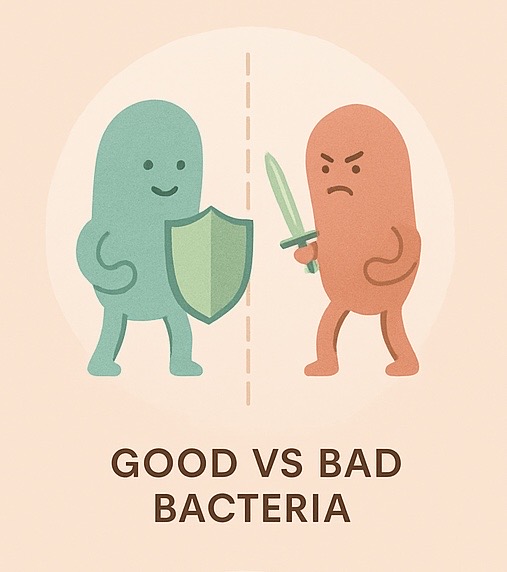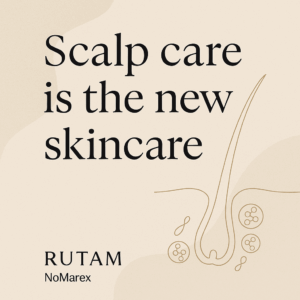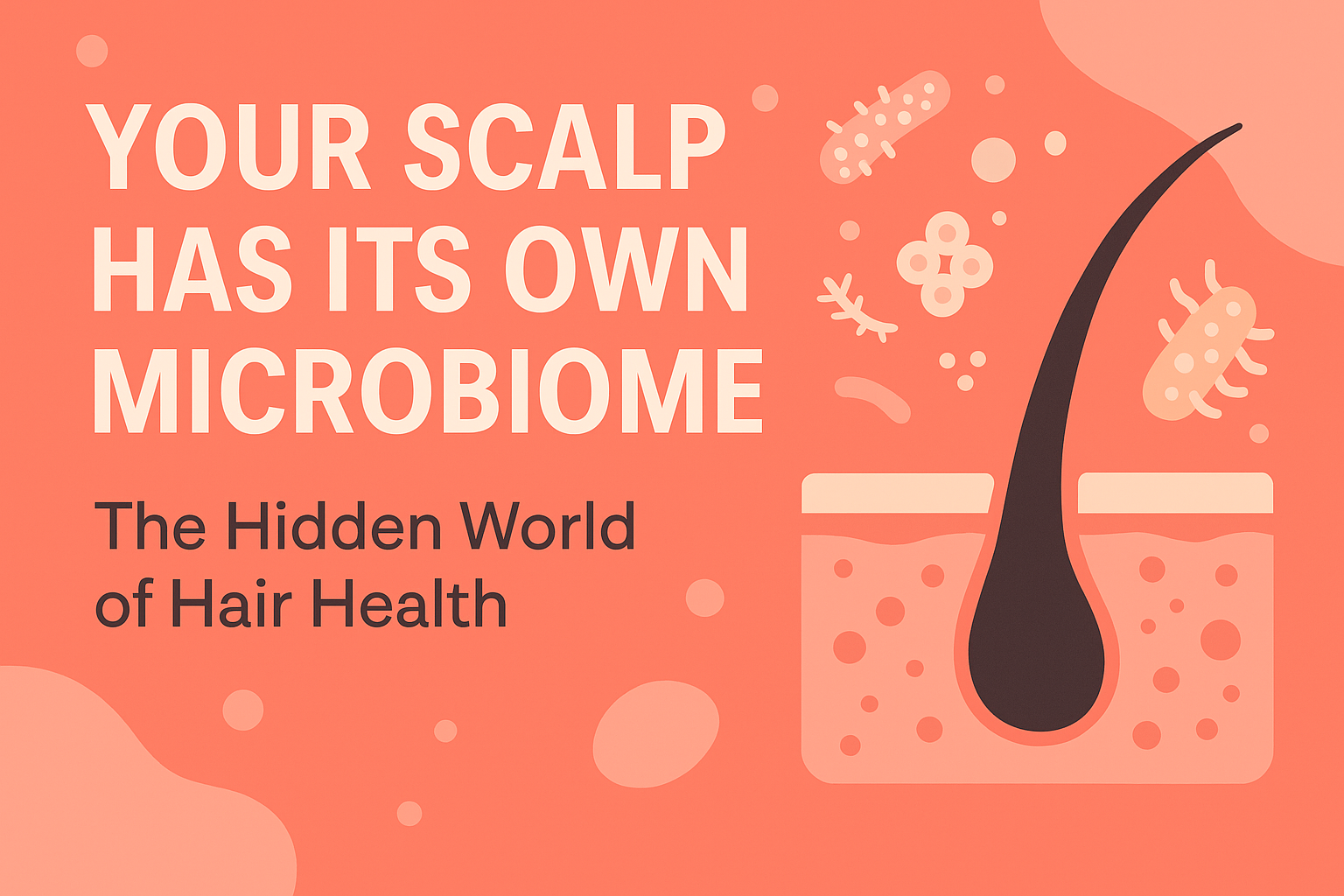Reading Time: 5 minutes | Word Count: 1,200 words
Your Scalp’s Secret Superheroes
Ever wondered why some people seem to have naturally gorgeous hair that grows like weeds, while others struggle with thinning and breakage? The answer might surprise you—it’s not just genetics or expensive products. It’s the tiny army of beneficial bacteria living on their scalp.
Yes, you read that right. Right now, there are trillions of microscopic organisms living on your head, and some of them are working overtime to give you the best hair of your life.
Let me introduce you to your scalp’s unsung heroes.
Staphylococcus Epidermidis: Your Hair’s Bodyguard
Think of S. Epidermidis as the bouncer at an exclusive club—your scalp. This bacteria makes up about 65% of a healthy scalp’s microbiome, and it’s seriously protective of your hair follicles.
What this superstar does for your hair:
- Creates a protective shield against harmful bacteria
- Keeps your scalp’s pH perfectly balanced (around 5.0—slightly acidic, just how your hair likes it)
- Produces natural antimicrobials that fight off the bad guys
- Regulates oil production so your scalp isn’t too greasy or too dry
How to tell if your S. Epidermidis is thriving: Your scalp feels comfortable—no itching, no excessive oiliness, no weird smells. Your hair has natural shine and feels strong. Basically, you’re not thinking about your scalp at all because everything just works.
Fun fact: People with thick, healthy hair have 3 times more S. Epidermidis than those dealing with hair loss. Coincidence? We think not.
Cutibacterium Acnes: The Misunderstood Hero
Wait, isn’t this the bacteria that causes acne? On your face, yes—when it gets out of control. But on your scalp, C. Acnes is actually one of the good guys (when present in the right amounts).
Why your scalp loves C. Acnes (in moderation):
- Breaks down natural oils into fatty acids that maintain perfect pH
- Produces vitamin B12 and other nutrients your hair follicles crave
- Helps with natural exfoliation so dead skin doesn’t clog your follicles
- Prevents your scalp from becoming too alkaline (which bad bacteria love)
Think of it this way: C. Acnes is like that friend who’s amazing in small doses but becomes overwhelming at parties. Keep it balanced, and it’s your hair’s best friend.
Corynebacterium: The Chemical Warrior
This bacteria might have a complicated name, but its job is simple: produce natural antibiotics that target the troublemakers trying to invade your scalp.
What makes Corynebacterium special:
- Creates custom antibiotics for your specific scalp environment
- Breaks down inflammatory compounds before they can damage hair follicles
- Helps maintain your scalp’s moisture barrier
- Processes nutrients so your hair follicles can actually use them
It’s like having a personalized pharmacy right on your head, producing exactly what your scalp needs to stay healthy.
Lactobacillus: The Peacekeepers
You’ve probably heard of Lactobacillus in yogurt and probiotics, but did you know it’s also working hard on your scalp? These bacteria are the diplomats of your microbiome, keeping everything in harmony.
How Lactobacillus keeps the peace:
- Produces lactic acid that maintains optimal pH
- Creates anti-inflammatory compounds that calm irritated skin
- Supports your immune system’s response to threats
- Helps other beneficial bacteria communicate and work together
When your Lactobacillus levels are good, your scalp just feels calm. No drama, no inflammation, just healthy hair growth.
Signs Your Good Bacteria Are Winning
How do you know if your beneficial bacteria are thriving? Your scalp will tell you:
The good news checklist:
- ✅ Your scalp feels comfortable after washing
- ✅ Hair has natural shine without heavy products
- ✅ No weird smells, even at the end of a long day
- ✅ Minimal itching or irritation
- ✅ Hair feels strong and doesn’t break easily
- ✅ Consistent hair growth
- ✅ Products work well without causing sensitivity
The “needs help” warning signs:
- ❌ Scalp feels tight or itchy after washing
- ❌ Hair looks dull even with conditioning
- ❌ Unusual odors that don’t go away with washing
- ❌ Constant urge to scratch your head
- ❌ Hair breaks easily or feels brittle
- ❌ Slow hair growth or increased shedding
- ❌ Products that used to work now cause irritation
What Your Good Bacteria Need to Thrive
Just like any living thing, your beneficial bacteria have preferences. Give them what they love, and they’ll reward you with amazing hair.

The bacterial wishlist:
- Gentle, pH-balanced cleansers (harsh shampoos are like bacterial warfare)
- Consistent moisture levels (not too dry, not too oily)
- Prebiotics (special ingredients that feed good bacteria)
- Stress management (stress hormones disrupt bacterial balance)
- Good nutrition (what you eat affects your scalp microbiome too)
What drives good bacteria away:
- Sulfates and harsh detergents
- Over-washing (stripping away protective oils)
- Very hot water (kills beneficial microorganisms)
- Antibacterial products (they don’t discriminate between good and bad bacteria)
- Chronic stress (releases cortisol, which disrupts microbial balance)
The Gut-Scalp Connection
Here’s something fascinating: your gut health directly affects your scalp microbiome. Scientists call it the “gut-scalp axis,” and it explains why some people notice their hair gets worse during stressful periods or when their digestion is off.
How to support both:
- Include probiotic foods in your diet (yogurt, kefir, fermented vegetables)
- Consider a high-quality probiotic supplement
- Manage stress through meditation, exercise, or whatever works for you
- Get enough sleep (your microbiome repairs itself at night)
- Stay hydrated (supports circulation to your scalp)
Building Your Bacterial Dream Team
The secret to amazing hair isn’t about eliminating all bacteria—it’s about supporting the right ones. When your beneficial bacteria are thriving, they naturally keep the troublemakers in check.
Quick wins to support your good bacteria:
- Switch to a microbiome-friendly shampoo (look for “probiotic” or “pH-balanced” on the label)
- Reduce washing frequency to every other day or less
- Use lukewarm water instead of hot
- Add a scalp serum with prebiotics or probiotics
- Manage stress through your favorite relaxation method
Remember, building a healthy scalp microbiome takes time—usually 4-6 weeks to see real changes. But once your good bacteria are established, maintaining healthy hair becomes so much easier.
What’s Next?
Now that you’ve met your hair’s best friends, you’re probably wondering about the villains in this story. In our next article, we’ll introduce you to the bacterial troublemakers that can wreak havoc on your scalp and learn how to keep them under control.
Coming up: “The Bad Guys: Bacteria That Are Sabotaging Your Hair Growth”
Ready to give your good bacteria the support they deserve? Start with one small change today—your scalp will thank you, and your hair will show the results.
Quick Takeaway: Your scalp is home to beneficial bacteria that work 24/7 to create perfect conditions for hair growth. Support them with gentle, microbiome-friendly products and healthy lifestyle choices, and they’ll reward you with stronger, healthier hair.

